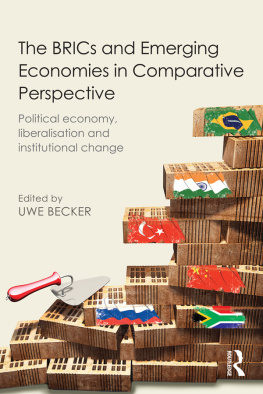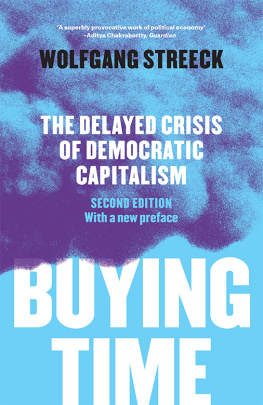Wolfgang Streeck - Re-Forming Capitalism: Institutional Change in the German Political Economy
Here you can read online Wolfgang Streeck - Re-Forming Capitalism: Institutional Change in the German Political Economy full text of the book (entire story) in english for free. Download pdf and epub, get meaning, cover and reviews about this ebook. year: 2011, publisher: Oxford University Press, genre: Politics. Description of the work, (preface) as well as reviews are available. Best literature library LitArk.com created for fans of good reading and offers a wide selection of genres:
Romance novel
Science fiction
Adventure
Detective
Science
History
Home and family
Prose
Art
Politics
Computer
Non-fiction
Religion
Business
Children
Humor
Choose a favorite category and find really read worthwhile books. Enjoy immersion in the world of imagination, feel the emotions of the characters or learn something new for yourself, make an fascinating discovery.

- Book:Re-Forming Capitalism: Institutional Change in the German Political Economy
- Author:
- Publisher:Oxford University Press
- Genre:
- Year:2011
- Rating:5 / 5
- Favourites:Add to favourites
- Your mark:
- 100
- 1
- 2
- 3
- 4
- 5
Re-Forming Capitalism: Institutional Change in the German Political Economy: summary, description and annotation
We offer to read an annotation, description, summary or preface (depends on what the author of the book "Re-Forming Capitalism: Institutional Change in the German Political Economy" wrote himself). If you haven't found the necessary information about the book — write in the comments, we will try to find it.
Re-Forming Capitalism: Institutional Change in the German Political Economy — read online for free the complete book (whole text) full work
Below is the text of the book, divided by pages. System saving the place of the last page read, allows you to conveniently read the book "Re-Forming Capitalism: Institutional Change in the German Political Economy" online for free, without having to search again every time where you left off. Put a bookmark, and you can go to the page where you finished reading at any time.
Font size:
Interval:
Bookmark:
Re-Forming Capitalism

Great Clarendon Street, Oxford OX2 6DP
Oxford University Press is a department of the University of Oxford.
It furthers the Universitys objective of excellence in research, scholarship,
and education by publishing worldwide in
Oxford New York
Auckland Cape Town Dar es Salaam Hong Kong Karachi
Kuala Lumpur Madrid Melbourne Mexico City Nairobi
New Delhi Shanghai Taipei Toronto
With offices in
Argentina Austria Brazil Chile Czech Republic France Greece
Guatemala Hungary Italy Japan Poland Portugal Singapore
South Korea Switzerland Thailand Turkey Ukraine Vietnam
Oxford is a registered trade mark of Oxford University Press in the UK and in certain other countries
Published in the United States
by Oxford University Press Inc., New York
Oxford University Press 2009
The moral rights of the author have been asserted
Database right Oxford University Press (maker)
First published 2009
First published as paperback 2010
All rights reserved. No part of this publication may be reproduced,
stored in a retrieval system, or transmitted, in any form or by any means,
without the prior permission in writing of Oxford University Press,
or as expressly permitted by law, or under terms agreed with the appropriate
reprographics rights organization. Enquiries concerning reproduction
outside the scope of the above should be sent to the Rights Department,
Oxford University Press, at the address above
You must not circulate this book in any other binding or cover
and you must impose the same condition on any acquirer
British Library Cataloguing in Publication Data
Data available
Library of Congress Cataloging in Publication Data
Data available
Typeset by SPI Publisher Services, Pondicherry, India
Printed in Great Britain
on acid-free paper by the
MPG Books Group, Bodmin and Kings Lynn
ISBN 9780199556779 (hbk.)
9780199573981 (pbk.)
10 9 8 7 6 5 4 3 2 1
In writing this book I benefited from the support of two truly outstanding institutions. When I started, in February 2007, I had just begun a half-year term as a Visiting Scholar at the Russell Sage Foundation in New York. When I finished a year later, I had been back at the Max Planck Institute for the Study of Societies in Cologne, also known as the MPIfG, for several months. Nobody in the world of social science knows better than Eric Wanner at Russell Sage how important it is for scholars to be given time, not just to do research, but also to reflect in quiet and solitude on their findings. And nowhere else in the world could I have found a more congenial and exciting environment than at the MPIfG, where new ideas come up all the time in projects, seminars, conferences, and discussions and may be explored in a scholarly community that includes everyone, from famous leaders in their fields to graduate students, until they can finally be written up, sometimes at a place like the Russell Sage Foundation on the East Side of Manhattan.
The present book had a long period of gestation, going back to the mid-1990s. It was then that I became more convinced than ever that what was going on in Germanys political economy might offer important general insights. A research group then began to emerge at the MPIfG that came to include scholars, mostly at an early stage of their career, like Anke Hassel, Jrgen Beyer, and Bernhard Ebbinghaus; Martin Hpner and Britta Rehder; and Christine Trampusch and Armin Schfer. Over time, the group also included several graduate students, among them were Gregory Jackson and, of course, Martin and Britta, who later joined the institute as full-time researchers. In addition there were my colleagues as directors, Renate Mayntz and Fritz Scharpf, both now retired but still very involved in research, and later Jens Beckert, who joined the institute in early 2005. Renate and Fritz are a source of continuing inspiration, the former because of her unflinching conviction that social science can be methodologically sound without having to become scientistic or irrelevant to the real world, and the latter because of his profound insights into German politics and the politics and economics of the modern welfare state. As to Jens Beckert, he has been reminding all of us about the significant contribution theoretical sociology can make to the study of political economyan insight that has become fundamental for the further development of our research.
One of the inestimable benefits of an institution like the MPIfG is that it makes it possible to build and maintain extensive working relations with scholars in other countries. So many colleagues outside the institute have contributed directly and indirectly to the ideas developed in this bookwithout, of course, being in any way responsible for what is still unfinished or, worse, unfoundedthat I cannot mention them all. To name just a few, the MPIfG is lucky to have Kathleen Thelen and Colin Crouch as External Members, just as we enjoy the support of our Scientific Advisory Board, chaired by Peter Hall, who knows that without vigorous debate there can be no progress in scholarship. I was also inspired by several sessions of the Complementarity Project, run jointly in Paris and Cologne by Bruno Amable, Robert Boyer, and me, which included David Marsden and Peter Hall among the participants. And there is also SASE, the Society for the Advancement of Socio-Economics, and its journal, the Socio-Economic Review, both of which are great meeting places for ideas and the people that produce and work with them.
As to this book in particular, while it draws extensively on a decade of research at the MPIfG and beyond, trying to pull together the results of a great number of projects, I am especially indebted to Kathleen Thelen, Marius Busemeyer, Martin Hpner, Britta Rehder, Armin Schfer, and Christine Trampusch, who read the manuscript as it was being written and provided excellent comments and criticism. Above all, Kathy Thelen, cherished colleague and friend for decades now, not only made extremely helpful suggestions but also offered essential encouragement at an early stage, when I sent her the first sketch of what I then expected to become my argument. I am also grateful to faculty and students at the NYU Sociology Department and the Columbia Political Science Department, where I had the opportunity to present my work when it was still in what I hope was progress. Heartfelt thanks must go to my fellow members of the Russell Sage Class of 2007 who patiently listened to my European story during a session of the RSF internal seminar in May 2007, and to my students at Cologne who read the full manuscript and commented on it. Others who did so include Martin Hellwig and David Stark. Here as everywhere, the usual disclaimer applies, according to which nobody but the author can be taken to account for the many imperfections that remain in spite of all the help received.
A book that has come such a long way should not go without a proper dedication. I dedicate this book to my wife, Sylvia, in memory of our time in New York, when she listened patiently to my ideasat the park and the Public Library, in the subway, and during regular visits to the Metropolitan and, of course, the Brioand for making me aware that every book must come to an end, because there is only one thing in life that is worth working on forever, and this is not a book.
Wolfgang Streeck
Economizing and the Evolution of Political-Economic Institutions
Font size:
Interval:
Bookmark:
Similar books «Re-Forming Capitalism: Institutional Change in the German Political Economy»
Look at similar books to Re-Forming Capitalism: Institutional Change in the German Political Economy. We have selected literature similar in name and meaning in the hope of providing readers with more options to find new, interesting, not yet read works.
Discussion, reviews of the book Re-Forming Capitalism: Institutional Change in the German Political Economy and just readers' own opinions. Leave your comments, write what you think about the work, its meaning or the main characters. Specify what exactly you liked and what you didn't like, and why you think so.









